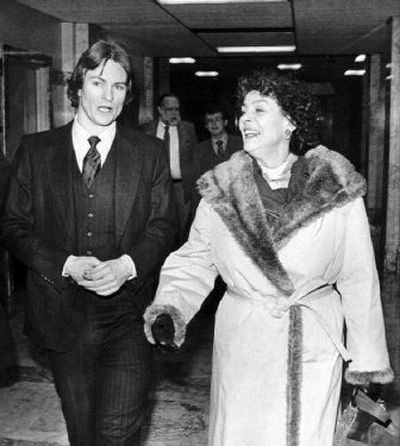State could keep rapist locked up

The South Hill rapist could be coming to a courtroom near you.
Again.
With convicted rapist Kevin Coe’s scheduled Sept. 8 release date fast approaching, state prosecutors have begun contemplating whether to pursue a civil case that could keep the prisoner behind bars until his death.
“The normal procedure is just we either file or we don’t,” said Greg Lane, a spokesman for state Attorney General Rob McKenna. “And that decision probably wouldn’t be made until just prior to that Sept. 8 date.”
Coe, now 59, is serving the final months of a 25-year prison sentence for rape. He was a suspect in more than 30 sexual attacks between 1980 and 1981 and became the subject of a nationally acclaimed book chronicling the case.
Under the violent sexual predator civil commitment procedure, prosecutors must convince a judge or jury that Coe has a mental abnormality that keeps him from controlling his sexually violent behavior and that he is likely to commit more violent sex crimes.
Most civil commit cases go to a jury, which would bring one of the most notorious criminal cases in Spokane history back to an already crowded court docket, said Superior Court Administrator David Hardy.
“It depends how the media reacts,” Hardy said. “If it’s high profile, it’s going to cost us more money. Since I have been here, (the 1981 Coe trial) was the biggest media event for the county.”
The Coe case generated more interest than the 1997 murder trial of former Spokane County sheriff’s detective Tom DiBartolo, who was convicted of killing his wife, and even the court hearings in 2000 for convicted serial killer Robert Lee Yates Jr., Hardy said.
“Yates was close, but that was diffused by all the pleas. We didn’t have a trial,” Hardy said. “If we had, it definitely would have been on the same order.”
Spokane County prosecutors charged Coe with six counts of rape in 1981 and a jury convicted him of four of those counts. However, all four rape convictions were overturned on appeal.
The charges were refiled and in 1985 a second jury convicted Coe of three of those original four rape charges. However, three years later, the state Supreme Court overturned all but one rape conviction because investigators used hypnosis during their interviews with witnesses.
With Coe’s release date pending, state prosecutors started reviewing the case for possible civil commitment, Lane said.
Deputy Spokane County Prosecutor Ed Hay said he sent 16 boxes of files last fall to his counterparts at the state.
Hay explained that to successfully designate someone a sexually violent predator, prosecutors will rely on the 25-year-old investigation and how Coe has conducted himself in prison.
“So they go through all the historical materials. They also go through current evaluations as to the risk factors and capability of treatment,” Hay said. “On this one … I don’t know whether the current review will support it or not.”
Lane said the case remains under investigation and said he can’t comment on that process. If successful, the state would send Coe to a Special Commitment Center at the prison on McNeil Island until he could convince a judge that he is no longer dangerous, which rarely happens.
The state must file the paperwork prior to Coe’s Sept. 8 release date or it can’t initiate the civil commitment proceeding against Coe unless he commits a new crime, Hay said.
Steve Matthews, the former deputy prosecutor who succeeded in convicting Coe in the second trial, said he is one person who hopes the state is able to civilly commit Coe.
“Obviously, I would be willing to help but they have their own people and procedures,” said Matthews, who now is in private practice. “I think the issue is not whether I would feel safe but what is in the best interest of the community at large. I hope that they take a very, very careful look at him and his circumstance.”
Once filed, prosecutors must first convince a judge that probable cause exists for the civil commitment. The trial would then be held before a judge or a jury. In the meantime, Coe would remain in custody pending that trial, Hay said. “I’ve seen several years until the trial occurs,” Hay said.
Coe, who has maintained his innocence throughout, was the son of Gordon and Ruth Coe.
Gordon Coe, who died in 1999, was a longtime editor at the Spokane Daily Chronicle and directed much of the coverage of the “South Hill rapist” until his son was charged in connection with the string of attacks.
Between Coe’s two trials, Ruth Coe was convicted of attempting to hire someone to kill the prosecutor at the time, Don Brockett, and the judge, George Shields. Ruth Coe died in 1996.
In a 1993 interview with the Associated Press, Gordon Coe strongly defended his wife and son. “We’re aware of it every minute of every day,” Coe said at the time.
The prosecutions of Ruth and Kevin Coe became the subject of a true-crime book, “Son” by Jack Olsen.
Requests to interview Kevin Coe in the Washington State Penitentiary in Walla Walla were unsuccessful Monday.
John Rodgers, director of Spokane County Public Defender’s Office, defended the first sex offender in Spokane County, Herman “Butch” Paschke, to be civilly committed as a sexual violent predator in 1999.
Rodgers said he’s opposed to the 1990 Community Protection Act because it gives the state another reason to keep offenders in prison.
“They can lock a human being up for the rest of their life without convincing (a jury) of a crime,” Rodgers said. “I think it’s an anomaly in our history.”